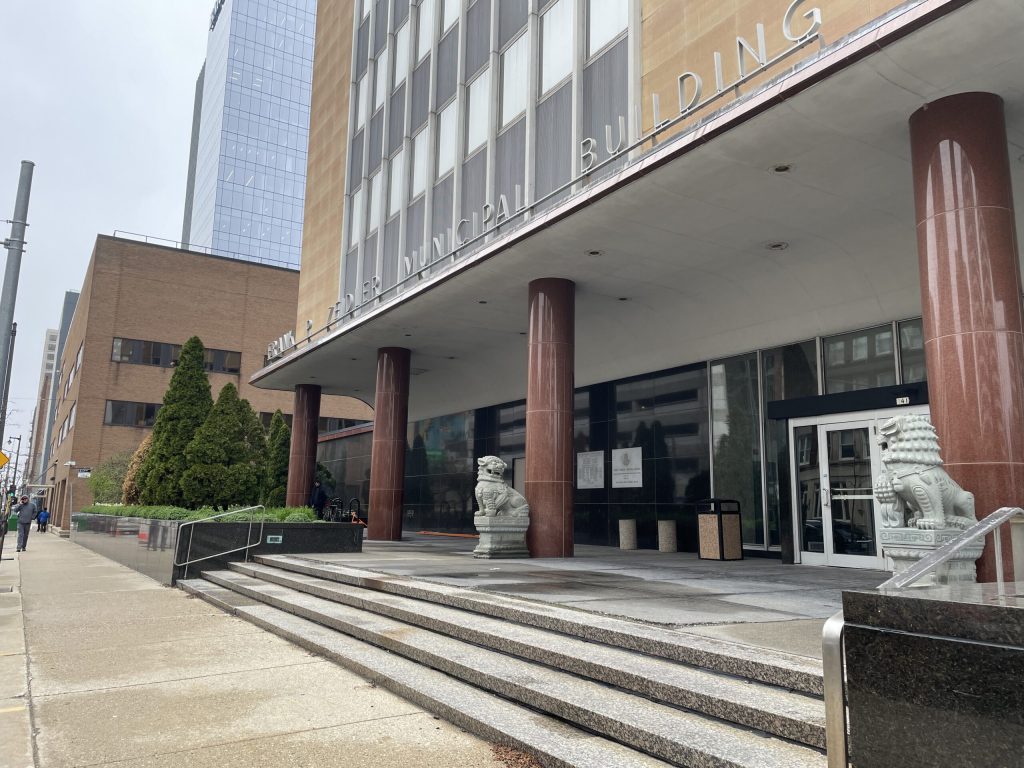Milwaukee Health Department Loses Millions To Federal Funding Freezes
Everything from HVAC upgrades at homeless shelters to wastewater disease monitoring impacted.

The Frank P. Zeidler Municipal Building in Milwaukee, which houses the Milwaukee Health Department, on May 1, 2025. Nick Rommel/WPR
The cancellation of about $11.4 billion in Centers for Disease Control and Prevention grants to local health departments are having an effect in Milwaukee.
On Thursday, Milwaukee Health Department Budget & Administration Manager Aaron Szopinski explained the impact to alders on the city’s Public Safety and Health Committee.
The grants, which were created during the COVID-19 pandemic, were halted in late March.
“We are disappointed, obviously,” Szopinski told alders. “I think we really relied on those funds to help us build a lot of resilience post-COVID.”
The Milwaukee Health Department received $6.6 million directly from the CDC as a Health Disparities Grant, to be used by May 2026.
That money was slated for three things — training and deploying 60 community health workers, making air circulation upgrades at two local shelters and placing public health nurses in “high-need ZIP codes,” a health department spokesperson said.
As of late March, $4.27 million had already been spent. The remaining $2.36 million has been frozen.
The department also got $3.9 million in grant money second-hand, via the state. It supported COVID-19 wastewater testing, sequencing meant to detect new variants and COVID-19 vaccine purchasing.
From that pool of money, $1.6 million has been spent and $2.3 million has been frozen.
When the grants were shut down in March, the federal agency said communities no longer needed the money.
“The COVID-19 pandemic is over, and HHS will no longer waste billions of taxpayer dollars responding to a non-existent pandemic that Americans moved on from years ago. HHS is prioritizing funding projects that will deliver on President Trump’s mandate to address our chronic disease epidemic and Make America Healthy Again,” the agency stated at the time.
Szopinski said the money was being used to fund ongoing projects.
“We use grants as a funding mechanism to do all the things that we need to do as a health department,” Szopinski said. “Those needs don’t change if our funding changes.”
He said the department is working on finding new funding sources for impacted programs, especially for those involving partners like the two local shelters, the Salvation Army Emergency Lodge and the Milwaukee Women’s Shelter.
Szopinski said the shelter ventilation upgrades were supposed to be done this summer, and were meant to help residents with COVID-19 or other respiratory diseases isolate from other residents.
“Literally, the HVAC equipment was purchased and it’s sitting,” he said.
“We’re fortunate that walls weren’t ripped open, but we were very close to hitting go on those projects,” he said.
He said the 60 community health workers were meant to “serve as a bridge to various public health purposes and programs.” Ten of them were in training when funds were frozen, a department spokesperson said.
Szopinski said that program, too, was “on hold.”
“We want to find a new way to do it,” he said.
He said the department evaluated possible risks to all their federal grant funding — $25 million in total — in February.
“I don’t want to say it’s four-dimensional chess, but it feels like it a little bit,” he said.
“We have some really critical programs in our clinics and health centers, and so our goal is to keep serving people at the highest level we can,” he said.
The Milwaukee Health Department was also affected by the recent layoffs of the CDC’s lead experts. The department had hoped for their help in Milwaukee Public Schools’ ongoing lead crisis.
All $4.66 million of the department’s frozen grants are subject to a lawsuit seeking to block the government’s cancellation of the grants. That lawsuit was filed by 23 states — mostly with Democratic governors — including Wisconsin. It’s currently in federal court in Rhode Island.
Canceled federal grants have effect in Milwaukee, health department says was originally published by Wisconsin Public Radio.
If you think stories like this are important, become a member of Urban Milwaukee and help support real, independent journalism. Plus you get some cool added benefits.





















